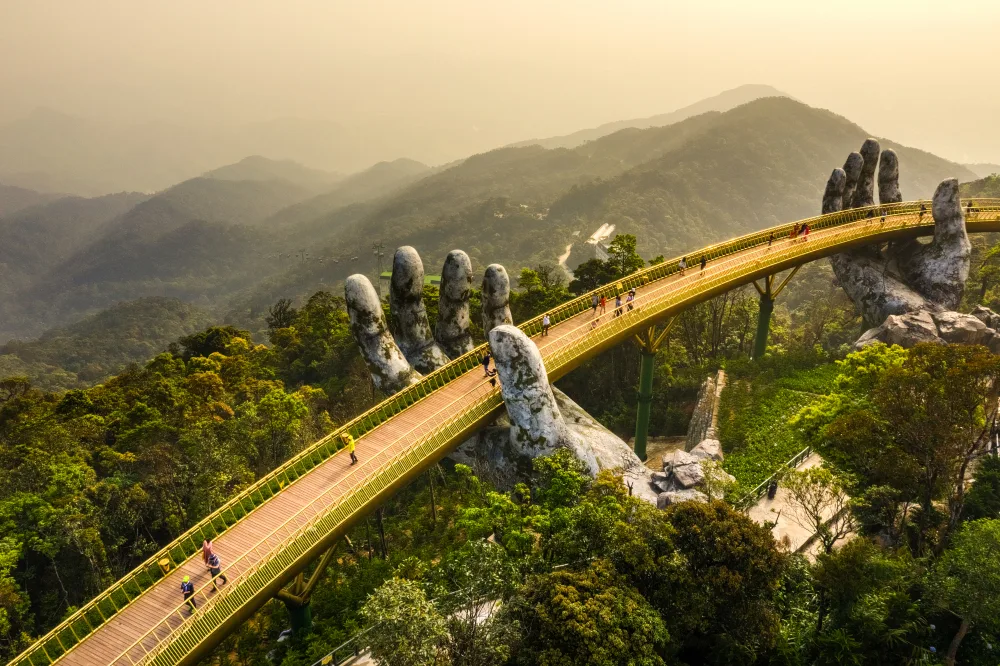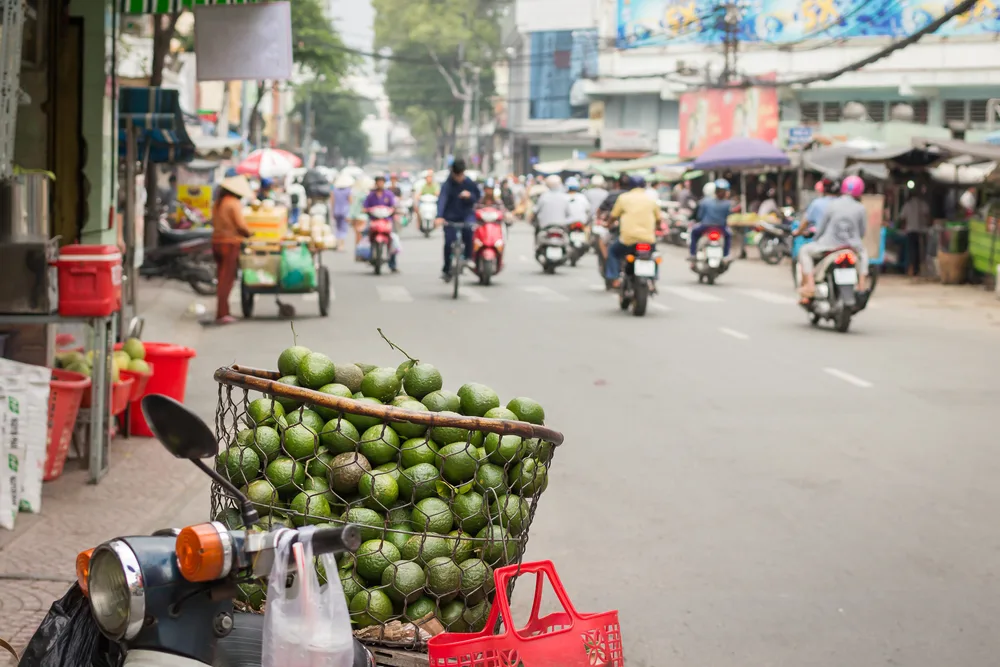Vietnam is one of the most popular countries for travelers visiting Southeast Asia. In 2019, Vietnam received over 18 million international visitors.
Visitors flock here to see the country’s amazing natural beauty, such as the pristine waters of Ha Long Bay or the massive cave systems of Phong Nha-Ke Bang National Park. Vietnam’s cities, from massive Ho Chi Minh City to historic Hanoi, also attract a lot of visitors.
Of course, no trip is complete without a taste of the country’s stunning gastronomy. But while this storied country may seem amazing on the surface, is Vietnam safe to visit? Here’s our expert take.
Is Vietnam Safe to Visit in 2025?

Hien Phung Thu/Shutterstock
Yes. Vietnam is a very safe place to visit, and most visitors have an amazing time. There is an elevated risk of petty crime such as pickpocketing and scams against visitors, but with some basic precautions, you can still have a safe trip.
Other security challenges are nearly nonexistent. A good place to start when researching the safety of a new destination is any travel advisories that are in place.
Most countries agree that Vietnam is mostly a safe place to visit. For example, the United States just tells its citizens to exercise normal precautions in Vietnam and has the country under a Level One travel advisory.
Other countries have more serious alert levels in place. For example, New Zealand has Vietnam under a Level Two travel advisory and tells its citizens to be careful of the elevated crime rate.
After all, the country does suffer from frequent crime. The most common crimes are:
- Pickpocketing
- Bag snatching
- Tourist scams
- Sexual harassment
- Sexual assault
- Drink spiking
Most of the crimes are petty in nature, as you can see, but there are also frequent incidents of gender-based harassment and violence.
Unfortunately, Vietnam is still a patriarchal society, and this mindset affects tourists as well as local women. Besides crime, you have other safety concerns to keep in mind.
Vietnam’s official National Administration for Tourism has a site with common health and safety concerns, including getting sick. Many travelers worry about food-borne illnesses and other diseases when coming to Vietnam.
The Vietnamese government offers helpful tips such as packing a medical kit before you go, wearing a mask in the cities if you have respiratory conditions that might be irritated by pollution, and not drinking tap water or ice.
The country is fortunately not prone to many natural disasters. However, like most Southeast Asian countries, it experiences a rainy season and a dry season.
During the rainy season, which lasts from June to November, the country might experience monsoons, typhoons, and flooding, particularly around the Mekong Delta.
Always check the weather reports ahead of time or time your trip to coincide with the dry season.
Crime in Vietnam

HANOI, VIETNAM – OCT 02, 2019 : Restaurants near train street in Hanoi at night/Avinash Gatreddi/Shutterstock
The most common concern for visitors to Vietnam is crime. Anecdotal evidence and statistics say that Vietnam has a high crime rate, and tourists are often victims of those crimes.
The good news is that most crime is petty in nature, such as pickpocketing, scamming, and drug abuse. The violent crime rate is very low and almost never affects visitors.
According to World Bank data, the intentional homicide rate hovers around 2 incidents per 100,000 people, which is a very low rate and much lower than the global average. Theft and other forms of property crime are a different matter.
According to Numbeo, which sources information about crime from people living in a place, Vietnam scores a 40.94 out of 100 on the crime index, which is a moderate value.
Respondents reported elevated rates of crimes such as break-ins, robberies, vehicle thefts and break-ins, drug abuse, and theft. Certain areas of Vietnam have higher crime rates than others.
For example, the U.S. Embassy in Vietnam warns visitors that rates of street crime are high in the cities of Hanoi and Ho Chi Minh City.
Most crimes are crimes of opportunity — and confused foreigners do tend to provide the best opportunity. These are the two most populated cities in Vietnam, so it makes sense that they also have the highest rate of street crime.
There are a few reasons why street crime is so prevalent in Vietnam. One is the large income gap between most tourists and locals.
Foreign visitors, even backpackers traveling on a budget, tend to be much wealthier than Vietnamese locals. Scammers may not consider themselves to be criminals, just people getting their due from a much wealthier tourist.
Although anti-Western sentiment has died down in Vietnam after the increase in tourism, many people still feel wary around Western tourists due to the history of the U.S. invasion and French colonial occupation before then.
Some Vietnamese see scamming Western tourists as payback for the harms that Western countries did to their country. Another, more sinister driver behind crime is the prevalence of organized crime.
Vietnam scores a 6.55 on the Global Organized Crime Index, making it #30 on the world’s ranking of countries with a crime problem.
Organized crime syndicates and mafia-style groups are behind crimes such as prostitution, drug trafficking, and human trafficking. Ever since Vietnam liberalized its economic system, it experienced an increase in crime, including organized crime.
Petty Theft
The most common crime tourists experience while in Vietnam is petty theft in all of its forms. Some thieves are pickpockets, others snatch bags from the back of mopeds, while others prefer to scam their victims instead of attacking them directly.
Street crime is most prevalent in the big cities of Hanoi and Ho Chi Minh City, but you should be on your guard anywhere that you go. Thieves target crowded areas such as bus and train terminals, markets, and popular tourist destinations.
Around busy periods, such as the Vietnamese New Year festival, Tet, thefts increase as thieves know there will be more people around and that they will have more cash on their person for gifts.
The Australian government also warns about the prevalence of theft from the back of motorcycles and mopeds. Motorcycles and mopeds are how most Vietnamese get around and weave through the busy traffic of their towns.
But some people use these easily mobile vehicles for more nefarious purposes — stealing items from unsuspecting pedestrians. Always carry bags and valuables on the side of your body that is further away from traffic to deter these thefts.
If someone grabs your bag from the back of a motorcycle, don’t fight back as many people have been injured by getting dragged behind a vehicle.
Besides outright theft, many criminals make their money by scamming tourists. Common scams happen when purchasing items, such as snacks on the street, as vendors will overcharge foreigners or purposefully return incorrect change.
Taxi drivers are also common scammers. Only take authorized taxis as unauthorized taxis overcharge guests or even worse, assault and rob them.
Be careful when a taxi tells you that your hotel or other destination is no longer working and offers to take you elsewhere — this is a common trick they use to drive tourists towards hotels that give them commission.
Besides these petty scams that inconvenience tourists more than anything else, there are more serious scams that cost tourists thousands of dollars. The Canadian government warns its citizens about the prevalence of gambling scams.
Beware of new acquaintances inviting you to their homes, and then beginning a friendly wager. These scams sometimes cost victims thousands of dollars.
Basic precautions are usually enough to protect you from most pickpockets, bag thieves, and scammers. Don’t flash your valuables or draw attention to yourself.
Always keep a close eye on your valuables and possessions. Practice firmly saying “no thank you” to touts and others trying to get your attention on the street, and always count your change carefully.
Sexual Assault
Although violent crime against tourists is rare, unfortunately one form of violent crime does happen with some regularity and that is sexual assault.
Female travelers in Vietnam often report unpleasant experiences such as catcalling and inappropriate touching. In some situations, these incidents have escalated into sexual assault.
The UK government warns its citizens that travelers have reported sexual assault and rape in Vietnam in the past. Criminals often target visitors to popular tourist towns or expatriate areas, such as Vietnam’s famous beach towns.
Unfortunately, Vietnamese authorities are not known for helping victims of sexual assault seek justice, and there is often victim-blaming, especially if there was alcohol involved.
There have been situations with drink spiking, especially in places frequented by tourists. While you cannot completely avoid this danger, you can try to minimize your risk.
When you go out drinking, only go with people you trust and pay close attention to your drinks at all times. Dress modestly to try and fit in with local women. Never travel alone at night and only use reputable forms of transportation such as metered taxis.
Avoiding Bad Areas

PJjaruwan/Shutterstock
Vietnam doesn’t have many no-go areas. As mentioned above, the cities of Hanoi and Ho Chi Minh City have the most street crime. You should still visit them but exercise increased caution as you move around.
The legacies of the brutal Vietnam War still affect the country, and decades later there are still countless unexploded ordinances and landmines.
Be careful in rural areas of North and Central Vietnam, near the Laos border, and in Quang Tri province. Stick to marked paths and don’t go frolicking through deserted fields.
Things to Consider
Here are a few other things to keep in mind when traveling in Vietnam:
- Vietnam has the 3rd-highest rate of traffic fatalities in Asia. Be very careful when traveling. If you opt to hop on one of the popular motorcycles, always wear a helmet.
- Organized tours are other common scams, so research tours ahead of time and beware of offers that seem too good to be true as there is often no way to get your deposit back if a tour doesn’t live up to its promised expectations.
- Drugs are illegal in Vietnam and dealers often cooperate with police to entrap buyers. Don’t partake in any illegal substances, no matter how tempting, as penalties are very strict.
- Respect the Vietnamese weather. It gets hot and humid in the summer, so wear sunscreen and hydrate regularly.
Frequently Asked Questions

Efired/Shutterstock
Here are common questions other visitors to Vietnam wanted to know the answers to:
Is Vietnam safe for tourists now?
Yes, Vietnam is now safe for tourists. The crime rate is decreasing, and scams are less prevalent than they were a decade ago as people get used to tourists.
Is Vietnam safer than Thailand?
Vietnam is safer than Thailand, as it has a lower crime rate and lower risk of civil unrest. However, both countries are mostly safe, although you will have to closely watch your valuables.
Is it safe to walk at night in Vietnam?
In safer cities, such as Hue, it is safe to walk at night in Vietnam. However, don’t go to notorious red light districts, walk down deserted side streets, or in neighborhoods with high crime rates.
Is Ho Chi Minh City safe for tourists?
Ho Chi Minh City is mostly safe for tourists. However, it has the highest street crime rate in Vietnam (which makes sense, since it is the biggest city). Plus, many tourists find the size and crowds of the city intimidating.
Is Vietnam inexpensive to visit?
Yes, Vietnam is inexpensive to visit. The costs of accommodation, food, and other items are very affordable when you are in town.
So, Is Vietnam Safe to Visit?
You can pack your bags for your Vietnam trip without thinking too much of it, because Vietnam is mostly safe to visit! However, make sure that you pack a money belt, secure bag, and copies of your ID as a precaution against theft because petty crime rates are high.
So, with so much to see and do, what are you waiting for — book your trip today!



